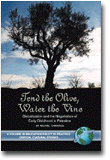
Tend the Olive, Water the Vine
Globalization and the Negotiation of Early Childhood in Palestine
Edited by:
Rachel Christina
A volume in the series: Education Policy in Practice: Critical Cultural Studies. Editor(s): Rodney Hopson, American University. Edmund Hamann, University of Nebraska-Lincoln.
Published 2006
Current international development wisdom promotes the inclusion of non-governmental organizations (NGOs) in national-level policy making, in the interest of strengthening state-civil society relationships; supporting locally driven, culturally-sensitive development; and contributing to program and policy innovation. However, critics of increased state-NGO-donor collaboration argue that it actually dilutes the power of NGOs to act in the interest of the local populations they were established to serve.
This tension between the local and the global is connected to broader debates about the nature and role of contemporary educational development. Should education aim primarily at preparing citizens for participation in the global economy, thereby encouraging the integration of nation-states into a world economic system driven by the industrialized North? Or/and should it endeavor to develop in students and in communities, North and South, the ability to critique, resist and transform that world system? Ultimately, this is a question of who “owns” development – international agencies and institutions, or the communities being “developed.”
This book examines the complexities of these negotiations in a particularly complicated and volatile context (Palestine) and a particularly “hot” development field (early childhood development). The international community’s efforts to support early childhood programming in the developing world fall more broadly within the empowerment camp than do other development efforts, and -- in this case in particular -- serve as a source of important lessons about the dynamics of donor-state-NGO relationships, suggestions for improved development policy, and insights into forms of education which promote justice and equity in an increasingly interdependent world.
CONTENTS
Foreword. Introduction. Chapter 1: History and Context. Chapter 2: Civil Society, Education and the World System:
Rethinking Globalization Theories. Chapter 3: Local Capacity and Local Control: Teacher Training as a Lever for Change. Chapter 4:
Reflection into Action: Community Support and the Empowerment Agenda. Chapter 5: Paper Policies, Shadow Policies, and Local Control: ECRC and National Programming for the Early Childhood Sector. Chapter 6: Filtering Up? ECRC’s Influence on Donor Agencies and Institutions. Chapter 7: Localization, Globalization, and the Reflective Lens: Implications for Development from the ECRC Case. Epilogue: A Dream Deferred. Appendix: Ethnographic Methods in a Case Study of a Non-Governmental Organization. Bibliography.
-
Paperback978-1-59311-166-3
Web price: $45.04 (Reg. 52.99)
-
Hardcover978-1-59311-167-0
Web price: $80.74 (Reg. 94.99)
- eBook9781607525592

- EDU015000 - EDUCATION: Higher
- EDU037000 - EDUCATION: Research
- EDU023000 - EDUCATION: Preschool & Kindergarten
-
 Educated for Change?
Muslim Refugee Women in the West
Educated for Change?
Muslim Refugee Women in the West
-
 Learning to Hide
The English Learning Classroom as Sanctuary and Trap
Learning to Hide
The English Learning Classroom as Sanctuary and Trap
-
 Navigating the Volatility of Higher Education
Anthropological and Policy Perspectives
Navigating the Volatility of Higher Education
Anthropological and Policy Perspectives
-
 Paths to the Future of Higher Education
Paths to the Future of Higher Education
-
 Researching Race in Education
Policy, Practice and Qualitative Research
Researching Race in Education
Policy, Practice and Qualitative Research
-
 Revisiting Education in the New Latino Diaspora
Revisiting Education in the New Latino Diaspora
-
 The Construction, Negotiation, and Representation of Immigrant Student Identities in South African schools
The Construction, Negotiation, and Representation of Immigrant Student Identities in South African schools

